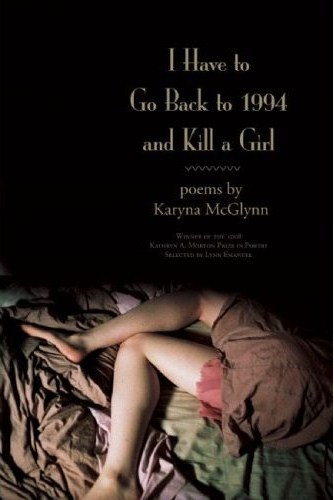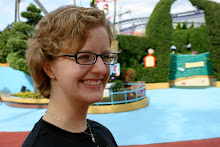Because I'm out of school, that means my interaction with people of a poetical bent is limited to Facebook and StumbleUpon accidental encounters, sprinkled with the occasional text from people who feel like being poetic. This means that I'm at home and my family don't really do poetry like I do. If at all. So in an attempt to get myself back into a poetic mindset, I've been looking for books of poetry at my local library. After reading Mary Jo Bang's Bride of E, I picked up Karyna McGlynn's I Have to Go Back to 1994 and Kill a Girl.
 |
| Thank you, Google! |
(Brianna enters her local library and retrieves her poetry books from the inter-library loan shelves. On top of her pile is a book of poetry by Karyna McGlynn. She slides her stack of books onto the check-out counter.)
Brianna: (rain-soaked but cheery, carrying a large duffel bag) I'd like to check out these books, please!
(Librarian, who knows Brianna, looks at the cover and the title of the book on top of her stack and gives her a look that says something along the lines of, "Trying to tell me something, Brianna? Is this a confession?")
Brianna: (realizing what the look must be about) Oh! I've been writing a poem a day since September, so I needed more poetry to read.
Librarian: (raises his eyebrows) Good for you, Brianna. But you know copying poems from here doesn't count...
(Brianna chuckles nervously and stuffs the books in her duffel, leaving the library hastily.)
I have no intention of copying poems out of this book, but I had hoped I could use it as some sort of inspiration. On a whole, this book is nothing that I had expected. Significantly darker and more sexually charged than I would have expected, Kill a Girl is a fascinating read.
The way McGlynn formats the majority of her poems is really interesting. A couple poems (for example, "I Want to Introduce Myself, Not Quite Human," "The Thing in the Middle Which Has No Corner," and "Somebody Shook Me: Wake Up It's Raining Oil") use multiple columns, most commonly two or three. While I was reading, I wasn't quite certain if I should read straight across left to right or if I should be reading the left column and then the right column, so I tried it both ways, and I found out that most of the poems could work either way. Granted, you get a different poem depending on which way you read it, but I thought the effect created an shakiness within the structure of the poem that was both thought-provoking and alluring. In addition to her column structure, McGlynn also uses a sort of woven formatting that you can see in "The Poem with Its Teeth Caught In the Carpet." Kind of like this:
1111111111111111
22222222222222
3333333333333 3333333333333
4444444444444
So I wasn't sure if I should read the first line then the first half of the third line and go from top to bottom following each semi-column or if I should read the first line, the second line---you really don't need to know all of how I was thinking through this, but point being, I thought that the effect was really neat.
McGlynn's use of language is phenomenal. I'm not sure how she does it, but she manages to paint images within short lines and jump to the next image almost immediately. She doesn't shy away from words like "panties" or "crotch," but she owns them along with the sparse appearances of the word "fuck." She is unapologetic and dark, but still you want to read on. I was nervous that I was going to get all uncomfortable and not want to continue reading, but that wasn't the case at all. Each one of McGlynn's poems is saturated in imagery, so much so that it would be safe to say that I would be able to go back to these poems and still find new things to think about. Definitely a thought-provoking read.
PROMPTS:
1. Play with line breaks. See if you can create a "woven" or column poem that makes sense in multiple directions.
2. Experiment with line length. In "The Nursery with Half a Window Up Near the Ceiling," the lines alternate between longer lines and short lines. What effect does this have on the poem and what can it create in one of your's?
3. Many of McGlynn's poem titles lead into the actual poem. Can one of your first lines be used as the title so you just start right in the poem right away?
4. In "I Show Up Twelve Years Late For Curfew," the speaker's parents don't seem to recognize her, and in the last stanza she says, "This is my family, these people so inept at things like / memory and monopoly, I feel like a trickster god / hiding my funny-money under the board." Can you create an extended metaphor based on a board game? What simple things can people be inept at but still be forgiven?
5. "I Want to Tell Her I Won't Need Calculus, I Want to Warn Her," doesn't have much to do with math. What subjects are actually unneeded? Would you warn someone? How can you warn them without really warning them? Or how can you use calculus to talk about something else worth warning someone about?
"why the animal stretched its neck is beyond me
it wasn't a black alpaca
it had eyes as Chinese stars but bigger
it had no chin or ears
it was peering at the sky and then at me"
- Karyna McGlynn, "In a Landscape the Color of Bleached Limes"

0 comments:
Post a Comment